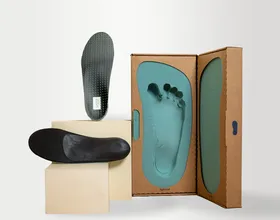How to Put Insoles in Your Shoes Correctly
When putting insoles into your shoes, you must ensure that they fit well and without contouring. Learn more on how you can do this from this post.
Published June 30, 2022.
Insoles are becoming more popular by the day. Otherwise known as footbeds or inner soles, insoles are removable shoe inserts placed inside shoes or boots to make them more comfortable. More specifically, insoles provide extra cushioning, shock absorption, warmth, and a better fit. They help to keep the foot neutrally aligned.
Insoles come in different types and sizes. While some are glued into the shoes, some are custom-designed for subsequent use in footwear. If an insole is to serve its purpose, it must be properly placed in the shoe. Otherwise, it will distort the foot alignment and may cause pain.
Though many conditions may require orthotics, often podiatrists are the ones that determine who needs orthotics. If you happen to experience frequent stabbing pain or pressure in the heel, this may be one of the signs that you need arch support and should consult a doctor.
Correct Method for Putting Insoles in Your Shoes
If you’ve recently purchased an insole, know your work isn’t done. You must use the insole appropriately for maximum effect. To put insoles in your shoes correctly, take note of the following:
- Check the shoe to see if it has a glued insole, or if the insole is glue-free.
- Depending on what you find, insert the new insole, and check to see if it fits snugly from the front to the heel. If it doesn’t, you may need to trim it around the edges to ensure it contours properly.
- Slide your foot in the shoe to check if the insoles don’t make it too tight or not.
Can You Put Orthotics on Top of Insoles?
If you need more cushioning, you may need to add an orthotic on top of a pre-existing insole. This is possible when the previous sole is flat enough to accommodate the new orthotics without making the shoe tighter than necessary. Otherwise, if you don't remove the original insoles, your custom insoles will continue to slip and not fit properly. There are various types of orthotics to choose from and we can assist you with making the right choice.
Related Articles

Babafemi Adebajo
Knee Pain When Squatting: Causes and How to Fix It

Janik Sundstrom
Best Insoles for Running Shoes
Related Posts
Janik Sundstrom
Best Insoles for Work Boots and Flat Feet
Janik Sundstrom
How to Choose the Best Insoles for Overweight People
Janik Sundstrom
How to Find the Best Insoles for Sneakers
Janik Sundstrom
Best Insoles for Running Shoes
Janik Sundstrom
Best Insoles for Nurses to Relieve Fatigue
Janik Sundstrom
Do You Need Bigger Shoes to Wear Insoles?
Janik Sundstrom






